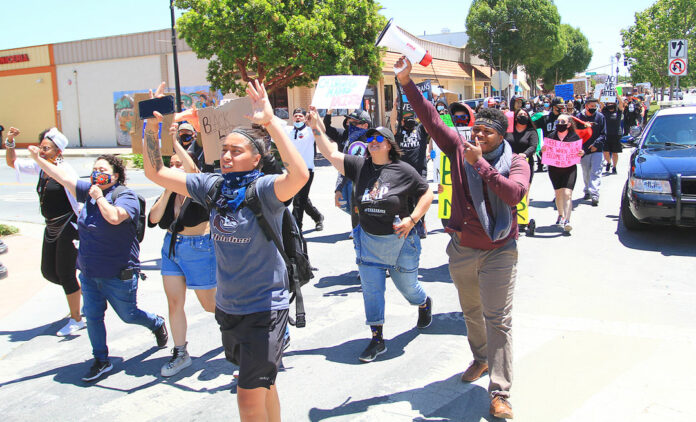
The year 2020 was unlike any other, as news of the Covid-19 pandemic nearly dominated headlines each week. However, there were other stories — some virus-related, some not — that also defined the South Monterey County community last year. Here is a look at one of those stories.
Protests call for reform
Activism in the form of protests was brought to the forefront in 2020, both on a national scale and also locally. Local protests remained peaceful and were aimed at raising awareness about injustices committed within the criminal justice system.
Protesters gathered June 6 at Vosti Park in Soledad before marching in the streets as part of the Soledad for George Floyd demonstration, itself an act of solidarity with Black Lives Matter in a nationwide call for an end to police violence.
The June 6 event was named after Floyd, who died during an arrest by Minneapolis police on May 25.
Sam Gomez, a local organizer and Soledad resident, co-organized the event with Nathaniel Sawyer, vice president of Democratic Club of Monterey Peninsula. The park gathering included poetry from Salinas resident Kenya Burton, spoken word by Queen Tay Elaine and speeches from Greenfield teacher Vanessa Robinson, Soledad Mayor Fred Ledesma and Sawyer.
“We are all here for a reason, to show up for Black lives and to express our solidarity within this movement,” Gomez said.
“I want to reassure you all that right now, you’re doing the right thing,” Robinson told the crowd. “I also want to make it clear that the protests and issues we’ve seen around the country for the past 12 days is not just a Black community issue, it’s an American issue.”
The widespread calls for reform had area cities considering changes to police operations, including the examination by Greenfield City Council if school resource officers at schools are a worthwhile investment, and the funding by Gonzales to add a counselor position to work as an alternative to the existing SRO starting in November.
Two protests were held in 2020 at the entrance to Salinas Valley State Prison and the Correctional Training Facility outside Soledad. Three-dozen protesters gathered on Aug. 6, and another dozen gathered on Dec. 19.
Organized by the group We Are Their Voices, the protesters in both demonstrations cited concerns over Covid-19 safety, mistreatment by correctional officers, overcrowding and the for-profit nature of prison operations. They asked for improved conditions, an end to mass incarceration and early release of the incarcerated in light of the pandemic.
The August demonstration was part of a statewide call for reform, with group members meeting with family and friends of the incarcerated at various facilities. The December protest was aimed specifically at the Soledad facilities after a spike in Covid-19 infections.
“I’m not asking for you to open those gates and let them all go, I know there’s victims,” said the group organizer, who identified herself as Dawn Marie. “Those COs (correctional officers) have loved ones to go home to, just like our loved ones have family to go home to,” she said. “We’re going to be out here, we’re going to keep fighting for change to mass incarceration.”
CTF had 779 new cases, for a total of 941 inmates infected, and multiple deaths within a two-week period in December, which sparked the follow-up protest.
In a Dec. 21 message posted on its website, California Department of Corrections and Rehabilitation stated it was working with public health partners on a distribution plan for incoming vaccines.













